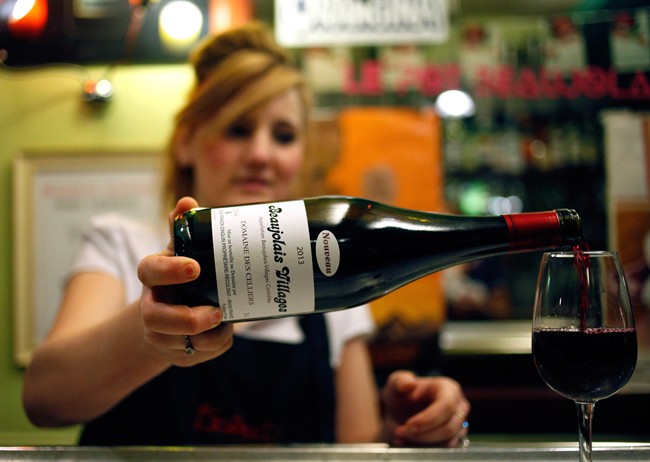A new liquor policy recommendation to the province could potentially mean a cheaper glass of wine when you dine out.

It’s one of 24 recommendations contained in a new report by long-time wine industry lawyer and liquor policy adviser Mark Hicken that was submitted to Attorney General David Eby earlier this week.
The report heard from a panel made up of a variety of stakeholders, including representatives of the restaurant, beer and wine industries.
The proposal would allow B.C. bars and restaurants to buy liquor at wholesale prices. Currently, licensees pay the same shelf price as the average consumer.
“I can’t think of another business that has to deal under this draconian sort of law, it’s absolutely ridiculous,” said Vancouver chef and restaurateur David Hawksworth.
“In Europe, you could negotiate with a chateau and purchase the wine from them, just like if I want to go to the farmer and purchase carrots.
“When you’re buying on the levels of which we’re buying, you know millions of dollars throughout the year. People would normally roll out the red carpet,” he added.
BC Restaurant and Food Services Association president Ian Tostenson was among the panelists, and said that most consumers are shocked to learn that restaurants — who are themselves retailers — are not paying a wholesale price similar to what private liquor stores pay.
“The other issue is that we have to buy from government stores, so B.C. is one of the only jurisdictions in North America that does that kind of procedure.”
WATCH: Restaurant industry blasts B.C. liquor distribution

Tostenson said that the system also creates uncertainty for licensees. Often, he said, they’ll be given a price by the producer for a product that isn’t regularly stocked by the LDB, such as a bottle of wine, only to find out that the BC Liquor Store has marked it up again before they get it.
The report found that these “hospitality price” retail margins being added to products were not consistent, creating further confusion for licensees.
The lack of wholesale pricing is a contributing factor to high restaurant prices for liquor, Tostenson explained, as establishments add their own mark-up on products in order to generate a profit.
He said letting restaurants buy at a wholesale price could end up being good news for consumers.
“You know, if we had a five, or let’s say a 10 per cent discount, you’re likely to see prices go down five, six, seven per cent in a restaurant, which in today’s restaurant would be very refreshing, wouldn’t it?” Tostenson said.
READ MORE: Think liquor taxes are too high? They’ll get higher next year… and every year after
Tostenson added that bringing prices down for restaurants could also bring some relief to an industry that is facing a number of new cost pressures, including the Employer Health Tax and rising wages due to a labour shortage.
“They’re being forced up a little bit by the minimum wage over the nexty four years, and that’s a big one because labour is about 30 per cent of your cost, maybe even more to run a restaurant,” he said.
“Rents have been going up for restaurants, taxes have been going up, food prices have been going up.”
Hawksworth said that consumers could very well see prices drop, but pointed to the same rising cost pressures Tostenson highlighted.
“We want to help our employees access benefits, and we want to do everything we can, but we’re going to need something in return. So hopefully this is a significant offer,” he said.
“It’s incredibly difficult operating a restaurant, so one or two per cent will make a huge margin, and hopefully it will be a lot more than that.”
WATCH: New B.C. liquor reforms resulting in higher prices

Hickens’s report acknowledges that switching hospitality customers from a retail to a wholesale price would come with a financial cost to the province.
In order to offset that, the report suggests the possibility of creating a second-tier hospitality wholesale price, along the lines of a five per cent markup.
Several other ideas proposed in the report would also benefit the restaurant industry, including allowing them to buy liquor from sources other than government stores.
That issue made headlines earlier this year when the government seized $40,000 worth of whiskey that handn’t been bought from the government in a “prohibition-style raid.”
WATCH: Government agents stage “prohibition-style” raids

The report also recommends creating a new distribution system to cut down on the sometimes weeks-long wait for products not carried by government stores.
Other ideas include granting permission for the brewing industry to deliver beer without going through LDB warehouses, changing the pricing formula for minimum prices on alcoholic products, and moving all regulatory functions from the Liquor Distribution Branch to the Liquor Control and Licensing Branch.
Attorney General David Eby said the province is looking at all 24 of the recommendations.
“B.C.’s liquor industry impacts hospitality, tourism, job creation, small business, and culture, and Mr. Hicken’s report and recommendations provide a valuable industry consensus,” he said in an emailed statement.
“Improving efficiencies and business relations between the liquor industry and government will benefit our manufacturers, retailers, and customers.”
Eby said the province is currently consulting with health experts and looking at whether recommendations would possibly violate trade agreements.








Comments